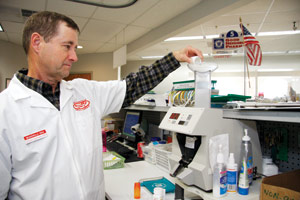In 1997, the city of Asheville was concerned about the rising cost of employee health care.
"It was extremely frustrating," recalls John Miall, who was then the city's director of risk management. "We would do what you're supposed to do — increase the deductible, increase the co-pay — and it just kept going up and up."

So Miall, together with other city and Mission Hospital officials, created the Asheville Project. Recognizing that the highest costs tended to be related to chronic conditions such as asthma, high blood pressure and depression, they set to work on the premise that an ounce of prevention is worth a pound of cure. Accordingly, they began providing classes on better ways to deal with those medical conditions while working to create better channels of communication between doctors and pharmacists. And to sweeten the deal, says Miall, employees (or their dependents) who attended the classes would receive their medications and related lab work for free.
"One of the challenges was that it seemed counterintuitive at first," he remembers. "When costs go up, there's a tendency to want to buckle down, save money. But the idea is that more frequent physician visits and free access to medications saves costs, because [people] avoid more expensive treatment when the situation gets worse."
And indeed, as participants became healthier, the cost to the city, which serves as its own health insurer, decreased. All told, the results have been impressive, says Destiny Mattson, the city's wellness coordinator, who currently oversees the program.
"For every dollar spent on the project, we've saved four," Mattson reports. "Currently there are 310 retirees, employees and dependents of the city enrolled in the program, and sometimes we've gotten that number as high as 400."
Mission Hospital also began participating in the program, and Clinical Pharmacy Programs Director Anna Garrett estimates that, all told, the Asheville Project now serves more than 1,100 workers and dependents associated with seven major local employers.
"Mission's role is to coordinate enrollment and provide care management," consulting and advising participants about which practices and drugs are best for them, says Garrett. "We'd helped the city get the project up and running, and we adopted it ourselves when we saw how much success they were having." Costs for participating employees, she notes, typically drop by $900 to $2,000 annually.
And while the city still spends a considerable amount on health care — a recent estimate cited it as one of the main drivers of the budget deficit — costs for Asheville Project participants have held steady.
A pioneering approach
Since its inception, the model has spread, and more than 100 municipalities and employers around the country — including the Biltmore Co. — have now adopted it, Miall reports. Last summer, Rep. Heath Shuler touted the project as a health-insurance model for the whole nation.
Miall, meanwhile, now runs his own consulting firm promoting the model and serves as special consultant to the American Pharmacists Association Foundation, which has also embraced it.
Notwithstanding all the attention, however, the Asheville Project does have its limitations: It helps only those who already have insurance, and so far, the model is being used only by groups such as local governments or large employers that are self-insured.
"We've had to put a lot of effort and marketing into convincing self-insured employers to adopt this model, but they have an incentive to cut costs that larger insurance companies don't have," notes Garrett. "There's also the challenge of finding enough care managers" to work directly with project participants.
Another problem, notes Miall, is that "People can be resistant to change. But this avoids having to go to the emergency room, or the intensive care unit, because of one of these conditions. It helps the patients — they become much healthier for little cost — and it helps the insurer."
In addition, the program encourages closer monitoring of patients' health and better communication between physicians and pharmacists. When a diabetes patient goes to the drugstore, for example, "The pharmacist will do some basic tests when the patient comes in to refill their medication," Miall explains. "If they see a problem, they're on the phone to the physician's office, and the patient has an appointment the next day."
Asheville, says Miall, has a lot to be proud of: "This model has spread across the country, and it started here, in Asheville, on day one."





Before you comment
The comments section is here to provide a platform for civil dialogue on the issues we face together as a local community. Xpress is committed to offering this platform for all voices, but when the tone of the discussion gets nasty or strays off topic, we believe many people choose not to participate. Xpress editors are determined to moderate comments to ensure a constructive interchange is maintained. All comments judged not to be in keeping with the spirit of civil discourse will be removed and repeat violators will be banned. See here for our terms of service. Thank you for being part of this effort to promote respectful discussion.